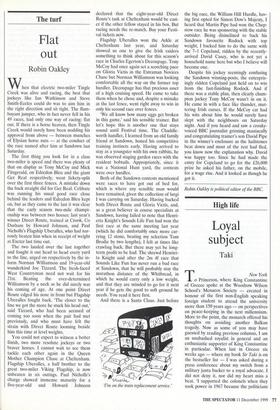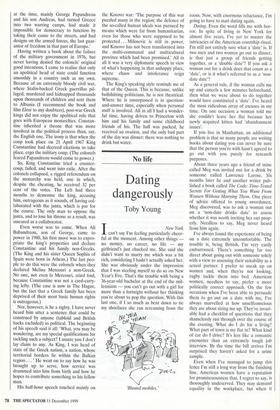High life Loyal subject Taki New York To Princeton, where
King Constantine of Greece spoke at the Woodrow Wilson School's Menaeos Society — created in honour of the first non-English speaking foreign student to attend the university more than 150 years ago — on perspectives on peace-keeping in the next millennium. More to the point, the monarch offered his thoughts on avoiding another Balkan tragedy. Now as some of you may have guessed by reading previous columns, I am an unabashed royalist in general and an enthusiastic supporter of King Constantine in particular. When last in Greece six weeks ago — where my book Sir Taki is on the bestseller list — I was asked during a press conference about my switch from a military junta backer to a royal advocate. I did not deny it, nor did my heart miss a beat. 'I supported the colonels when they took power in 1967 because the politicians
at the time, mainly George Papandreou and his son Andreas, had turned Greece into two warring camps, had made it impossible for democracy to function by taking their cause to the streets, and had designs on the armed forces, the last guar- antor of freedom in that part of Europe.'
Having written a book about the failure of the military government in 1976, but never having denied the colonels' original good intentions, I came to realise that only an apolitical head of state could function smoothly in a country such as my own. Because of an extremely bloody civil war, where Stalin-backed Greek guerrillas pil- laged, murdered and kidnapped thousands upon thousands of children and sent them to Albania (I recommend the book and film Eleni to any doubters), post-war Greek kings did not enjoy the apolitical role that goes with European monarchies, Constan- tine inherited a throne that was more involved in the political process than, say, the English one. The irony is that when the coup took place on 21 April 1967 King Constantine had decreed elections to take place, ergo the military coup. (The colonels feared Papandreou would come to power.)
So, King Constantine tried a counter- coup, failed, and went into exile. After the colonels collapsed, a rigged referendum on the monarchy was held, one in which, despite the cheating, he received 32 per cent of the votes. The Left had three months to demonise the king, accusing him, outrageous as it sounds, of having col- laborated with the junta, which is par for the course. The only man to oppose the junta, and to lose his throne as a result, was smeared as a collaborator.
Even worse was to come. When Ali Babandreou, son of George, came to power in 1980, his first move was to expro- priate the king's properties and declare Constantine and his family non-Greeks. (The King and his sister Queen Sophia of Spain were born in Athens.) The last peo- ple to do this were the colonels when they declared Melina Mercouri a non-Greek. No one, not even la Mercouri, cried foul, because Constantine was not a card-carry- ing lefty. (The case is now in The Hague, but the fact that a Greek family has been deprived of their most basic human rights is outrageous.) Nor, however, is he a righty. I have never heard him utter a sentence that could be construed by anyone (tabloid and British hacks excluded) as political. The beginning of his speech said it all: `What, you may be wondering, are my special qualifications for tackling such a subject? I assure you I don't lay claim to any. As King, I was head of state of the Greek nation, a nation, whose territorial borders lie within the Balkan region ... ' He went on to say how he was brought up to serve, how service was drummed into him from birth and how he hopes to contribute something to his fellow man.
His half-hour speech touched mainly on the Kosovo war: 'The purpose of this war puzzled many in the region; the defence of the so-called human ideals was pursued by means which were far from humanitarian, even for those who were supposed to be protected ... Milosevic is still in power, and Kosovo has not been transformed into the multi-communal and multicultural province which had been promised.' All in all it was a very diplomatic speech in view of what's happening in that unhappy place, where chaos and intolerance reign supreme.
The King's speaking style reminds me of that of the Queen. This is because, unlike bullshitting politicians, he is not theatrical. Where he is unsurpassed is in question- and-answer time, especially when personal stuff is involved. All in all I had a wonder- ful time, having driven to Princeton with him and his family and some childhood friends of his. The hall was packed, he received an ovation, and the only bad part of the day was dinner: there was nothing to drink but water.



























































































 Previous page
Previous page